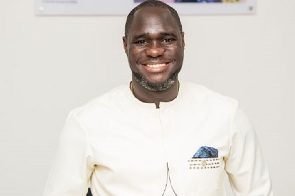Accra, Dec. 16, GNA - The World Food Programme (WFP) on Thursday unveiled a four-year Country Programme to support the Government to cater for hungry poor households to meet their educational, health and nutritional needs on sustainable basis.
The programme, which starts next year is aimed at reducing the level of malnutrition among risk pregnant and lactating women and children under five years and improve attendance and completion rates among school children in primary and girls in junior secondary schools. Ms Trudy Bower-Pirinis, WFP Representative in Ghana, who made this known during this year's annual UN System press soiree in Accra, said it would improve on national capacity to implement and scale up supplementary feeding and on site school feeding programmes.
It would also increase demand for domestic farm produce in response to newly created school feeding market requirements and leading to the phasing out of all external food aid by 2010.
Ms Bower-Pirinis said the programme value was 16.2 million dollars for 35,169 tonnes of food commodities and cash.
"The food basket, composed of 60 per cent of food commodities, is planned to be procured locally (subject to market prices and availability) for a value of 10 million dollars," she said. She said 75 per cent of the food basket would be fortified with micronutrients and essential vitamins and minerals such as vitamin A, iron and iodine.
Ms Bower-Pirinis also announced a sustainability strategy programme that would seek to establish linkages between agro-processors to enhance the development of local food markets, increase demand for agricultural products, stimulate local food production and increase rural farmers' income.
WFP, in collaboration with the Micronutrient Initiative would provide technical support to blended food suppliers and iodated salt, skill training in food processing and milling.
The country Director said in order to support market development in Ghana, WFP was asking its donors to provide two million dollars per year in advance during food harvest to procure market surpluses at competitive prices and minimise post harvest losses due to lack of credit and storage facilities.
Ms Bower-Pirinis said last year WFP purchased 800,000 tonnes of food commodities in Ghana and other States in Africa for nearly 190 million dollars, to support market development and income of local farmers.
"In Ghana WFP, has procured maize, pulses, vegetable oil and iodated salt,"
The purchase she said was also aimed at providing models for sustainability and appropriation of national feeding programmes; boosting the economies of developing countries by providing trade and aid and ensuring that the right commodities were available to WFP beneficiaries in a timely and cost effective manner.
Mr Luc Stevens Country Representative of UNHCR was full of praises for the ruling New Patriotic Party (NPP) for its tireless and successful efforts to bring peace and hope to war-torn Liberia.
"The three-year programme aimed at assisting Liberian refugees to repatriate in safety and with dignity is entering its second year following the election of a democratic government in that country," he said.
Mr Stevens noted that the major player in avoiding conflict was the media, adding that positive developments might be achieved mainly by means of responsible journalism.
Mr Daouda Toure, UN Resident Coordinator, joined his colleagues from the UN System in Ghana to give an overview of their programmes for the year and commended the media for the vital role they have played in disseminating such activities.
Mr Bright Blewu, General Secretary of the Ghana Journalists Association, lauded the cooperation the UN agencies had extended to the media and called for the deepening of relations in subsequent years. 16 Dec.05
General News of Friday, 16 December 2005
Source: GNA
















